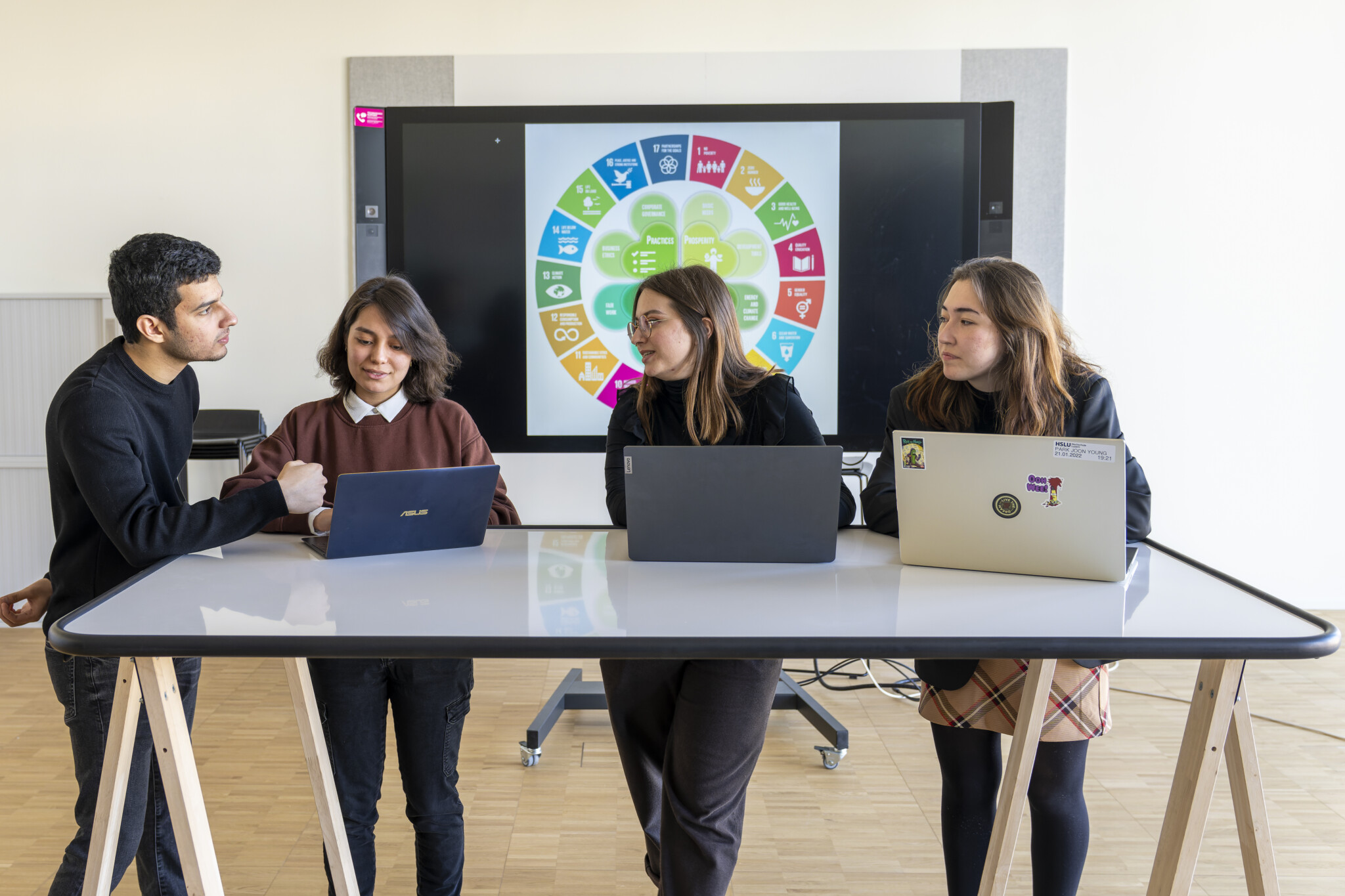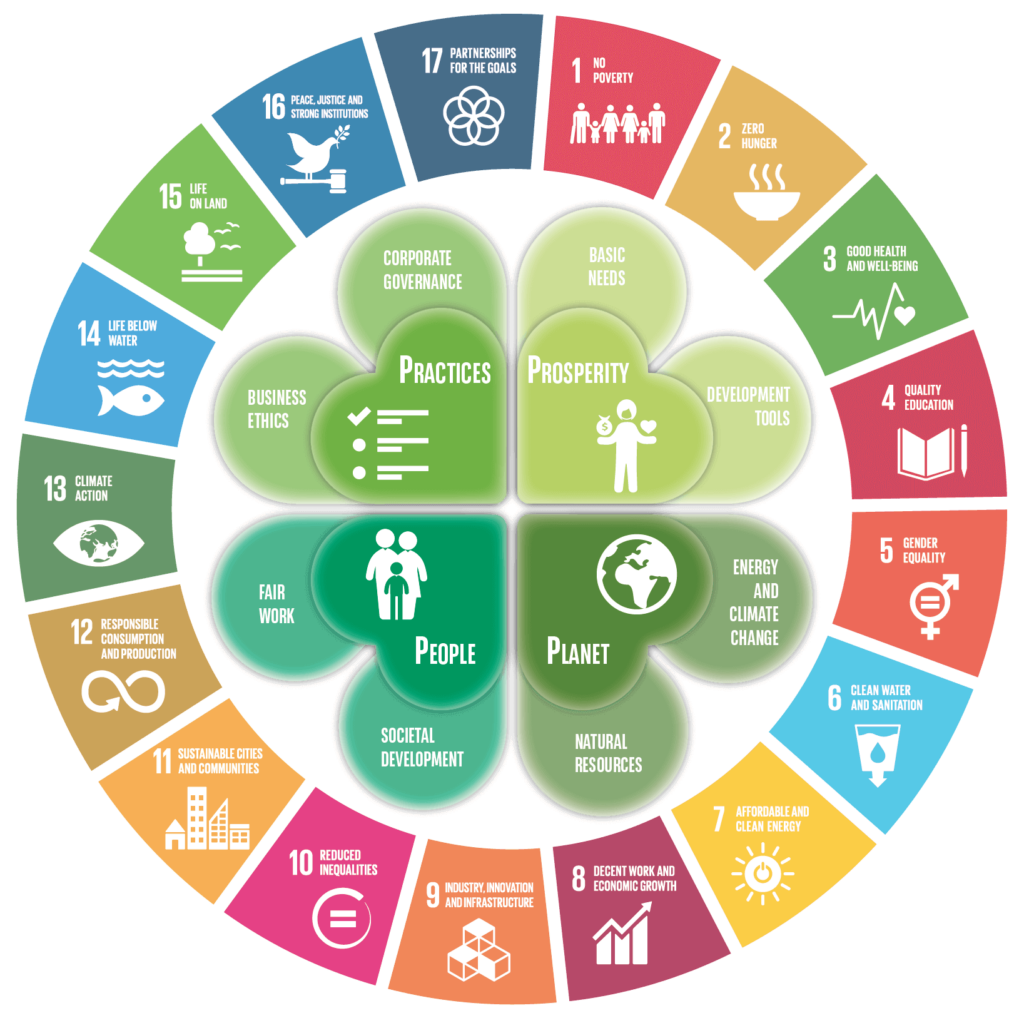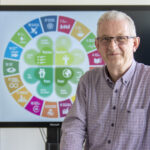Striving for a better world: a brand new IT Master’s with a sustainability focus
Make an impact against fake news or climate change through technology. Thanks to information technology, the struggle against foodwaste or corruption can be addressed and sustainably developed. How can this be accomplished? Post-grads will learn how on this new MSc in IT, Digitalization and Sustainability. Peter H Wullschleger, Head of the Degree Program has developed a degree with a highly future-oriented and intercultural angle.

By Yasmin Billeter
Mr Wullschleger, from Fall 2022, the Lucerne University of Applied Sciences and Arts, School of Computer Science and Information Technology will be offering the MSc in IT, Digitalization and Sustainability. Can you tell us how information technology can support or enable sustainability?
It’s very simple. Digital transformation in terms of economy and society is a global, on-going process. To cope with future demands and developments, all areas of society and economy must become more sustainable, for example, in areas such as renewable energies or improved recycling systems, but also in creating equal opportunities for all of us or fighting poverty.
Is there more to sustainability than fighting climate change?
Often, when hearing the term sustainability, Greta Thunberg immediately springs to mind. The fact is, though, that sustainable development is so much more than simply environmental aspects. Our focus is on all 17 of the sustainable development goals as set out by the UN. They include economic, social and also environmental and ecological dimensions of sustainability.

The 17 SDG’s in brief
- End poverty in all its forms everywhere.
- End hunger, achieve food security and improved nutrition and promote sustainable agriculture.
- Ensure healthy lives and promote well-being for all at all ages.
- Ensure inclusive and equitable quality education and promote lifelong learning opportunities for all.
- Achieve gender equality and empower all women and girls.
- Ensure availability and sustainable management of water and sanitation for all.
- Ensure access to affordable, reliable, sustainable and modern energy for all.
- Promote sustained, inclusive and sustainable economic growth, full and productive employment and decent work for all.
- Build resilient infrastructure, promote inclusive and sustainable industrialization and foster innovation.
- Reduce inequality within and among countries.
- Make cities and human settlements inclusive, safe, resilient and sustainable.
- Ensure sustainable consumption and production patterns.
- Take urgent action to combat climate change and its impacts.
- Conserve and sustainably use the oceans, seas and marine resources for sustainable development.
- Protect, restore and promote sustainable use of terrestrial ecosystems, sustainably manage forests, combat desertification and halt reverse land degradation and halt biodiversity loss.
- Promote peaceful and inclusive societies for sustainable development, provide access to justice for all and build effective, accountable and inclusive institutions at all levels.
- Strengthen the means of implementation and revitalize the global partnership for sustainable development.
Can information technology assist in all areas?
Yes, there are links in all areas. Sustainability and technology come into contact with each other in all these areas.
Can you give us some examples?
For example, using artificial intelligence to combat corruption. Or, consider how cyber security is vital in fighting hybrid forms of war. Yet another example is how food waste apps can be applied to reduce the amount of food ending up on food heaps, a direct link to SDG 2. A final example is how we can use machine learning to prevent the spread of fake news and thereby improve peace.
The Master’s degree is explorative, innovative and future-oriented.
So the aim of the new Master’s degree is to find solutions for all the world’s significant challenges? Isn’t that rather utopian?
The issue with sustainability is that most of us don’t take it seriously enough, hoping that the next generation will take care of it. But, at some point it will be too late. This degree is a step in the right direction, and a start. What many might not know is that until now, there has been no degree like it. We do not have any ready-made solutions; indeed, the Master’s degree is explorative, innovative and future-oriented.
It’s a fully taught-in-English Master’s degree and is aimed at an international student body.
What exactly is taught in the Master’s degree?
Students will learn what’s possible and how they can help shape the future. In the first two semesters, the delve into the following subjects and technologies: Intercultural Collaboration, Project Management & Leadership, Digital Transformation, Natural Language Processing & Information Systems as well as Artificial Intelligence & Machine Learning. All of these subjects will be linked to the UN’s 17 SDG’s. It’s a fully taught-in-English Master’s degree and is aimed at an international student body. Students will work together in projects and learn from each other.
In the second half of the degree, the students will take part in a compulsory semester abroad at one of our partner universities, and they will be able to choose their area of specialization. They will be free to choose a dual degree or joint degree, thereby attaining a Swiss degree as well as an international degree. Further, students can opt to continue on to PhD studies at one of our partner universities in Switzerland or abroad.
We will only be able to solve the world’s urgent problems if we cooperate internationally. Internationality is highly valuable.
Why do intercultural aspects play such a central role in this Master’s degree?
We will only be able to solve the world’s urgent problems if we cooperate internationally. Internationality is highly valuable. Where would Switzerland be if there was no international trade? Globalization has been somewhat braked by the recent pandemic, but it will no doubt remain of importance.
What type of student would be ideal for this program?
They should be self-confident and curious, have a sound understanding of technology and excellent communication skills. Sustainability and international cooperation should also be important to them. It is not a Master’s degree for the individual; but for those who are willing to face the world’s challenges in teams. There will undoubtedly be intercultural differences between the students, but this will make it even more exciting.
How will the practical aspect be included?
We will include case studies and projects as core elements of the program. The Master’s dissertation will involve research and so students will deal with a practically oriented research question or a concrete project from a real-life situation.
We will be training our students for any and all future jobs in these areas.
What sort of job prospects might the students expect upon graduation?
From the outset, the focus of this Master’s has been on the future. The future will be faced with digital transformation, IT and sustainability. So, we will be training our students for any and all future jobs in these areas. There is plenty of demand, as can be seen on job portals such as jobs.ch.
How important is the topic of sustainability for the School of Computer Science and Information Technology in general?
Until now, sustainability has not been particularly present in our curriculum. No doubt, certain elements and outcomes from the modules in this Master’s degree will have an influence and impact on electives and possibly even core modules at Bachelor’s level. As a department, we will also need to develop and address the sustainability goals. This new Master’s degree is a step in the right direction.
Published: 4 March 2022

Are you interested in studying IT, Digitalization and Sustainability at Master’s level? Contact the Head of degree program Peter H Wullschleger for your personal consultation: peter.wullschleger@hslu.ch, +41 41 757 68 03.
? Come to one of our (Online) Info Events: 8th march 2022, Campus Zug-Rotkreuz.
The Master’s Degree: The first half of the two-year degree program focuses on the following five subject areas:
- Intercultural Collaboration
- Project Management & Leadership
- Digital Transformation
- Natural Language Processing & Information Systems
- Artificial Intelligence & Machine Learning
All of these areas will be tightly linked to the UN’s 17 SDG’s.
In the second half of the program, cooperation with a select number of partner universities abroad takes place. Students will complete a compulsory semester at one of these partner universities and be able to achieve a dual or joint degree, and, may even opt to continue on to PhD study at one of our partners. The language of instruction is English and the degree has an international focus.
Start: Mid-September 2022
Who is this Master’s degree aimed at? The new Masters in IT, Digitalization and Sustainability is ideal for graduates in Computer Science, International IT Management, Business IT, or Engineering. There is a required GPA of 5.0 (Swiss grading system), skills in programming, mathematics and statistics, and English language ability at CEFR level C1 (Advanced), as well as a keen interest and passion for technology and the interdisciplinary content of the degree.
What sorts of professions can the graduates from the Master’s expect? Potential areas of work for graduates of this Master’s degree are extremely broad. With the growth in the relevance of digital transformation, disruptive technologies and sustainable development, even more new professions and areas of work will continue to be created. Here are a few examples:
- Leading complex IT projects in an international or intercultural field
- Leading projects in the digital transformation of corporations and their business models
- Carrying out and leading projects in connection with sustainable business models
- Consultation and project management in the areas of international added value chains, digitalization and sustainability
- Leadership of IT companies and/or related sectors
- International leadership positions in a variety of fields
Visit our IT Blog: Keep up to date with tips and news from the world of IT. We highlight key people and write about technology that forms the core of our department. Sign up for regular news and keep informed.



Kommentare
4 Kommentare
Maria
Sounds very woke!
Michael
Is that a full-time degree or also available as part-time option for students working on the side? Thanks a lot.
Nina Blaettler
Dear Michael, Thank you for your comment and question, I hope I can help. It's a full time degree program, encompassing 120 ECTS credits. Classes are held on campus, in person, weekly on Tuesday mornings (till 12); Wednedsays (all day) and Thursday mornings (till 12). There are no classes on Mondays and Fridays, and no classes on Tuesday and Thursday afternoons, so theoretically, it is possible to work part time. I should point out, though, that there is an amount of group and project work involved, for which some of the class-free time will need to be used. Finally, there is a component of this degree program which requires at least one compulsory semester abroad (30 ECTS). If you'd like any more information, please feel free to contact us for a non-being consultation (online or in person).
Nina Blaettler
Looking forward to the first info event on 8th March!
Danke für Ihren Kommentar, wir prüfen dies gerne.